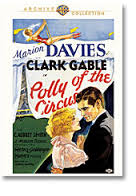
POLLY OF THE CIRCUS
US, 1932, 69 minutes, Black-and-white.
Marion Davies, Clark Gable, C. Aubrey Smith, Raymond Hatton, David Landau, Ray Milland.
Directed by Alfred Santell.
Marion Davies had a successful career at MGM during the 1930s, appearing generally in small budget films but enhanced by her lively presence. She also appeared with Clark Gable in Cain and Mabel.
Here she is a circus trapeze artist, upset by posters with skirts covering her tights, confronting the Reverend and blaming him residents local regulations.
In retrospect, one of the big features of the film is seeing Clark Gable as the Reverend Hartley, quite credible as a priest, devoted to the church, at the service of people, commonsense, sense of humour. He goes to the circus, sees her fall after being taunted by a heckler, allows her to recuperate in the Rectory despite the criticisms of the worker who is suspicious and condemns her. Eagle eyes will notice Ray Milland as the church usher.
Without celibacy restrictions, the couple fall in love, marry, but the congregation does not want her as a minister’s wife so she leaves and goes back to the circus. C. Aubrey Smith is the Bishop and uncle of the Reverend who is strong his judgements but finally relents – and the possibility of a happy ending.
1. A popular film of the early 1930s? The popularity of Marion Davies, comedian? Clark Gable and his career emerging?
2. Black-and-white photography, the American suburbs, small towns, the circus, the Rectory, the church? Musical score?
3. The title, the focus on Polly, the introduction, the posters for the circus, putting skirts pantaloons and corsets on the posters? The troupe in the train, watching, mocking Polly, her anger, assuming that it was the Reverend? Going to confront him? Her background in the circus, skills, the scenes of the trapeze work, her fall? A feisty character?
4. Clark Gable as the Rev Hartley? Credible clergyman? Gable’s image, dressed in clerical collar and suit? His role in the church? His uncle’s advice about moving parish? The encounter with Polly, his pleasant reaction, explaining local legislation, common sense? Saying that he went to the circus, going to the performance, sitting with the children, his response to her fall?
5. Polly, the trapeze artists, their skills, the heckler calling out, her fall, the injuries, difficult to move, going to the Rectory?
6. Downey, alcoholic, working at the church, his bitter attitudes, his criticisms of Polly, accusing her, always suspicious, blackening her name, his drinking, the service in the church, his starting to dust, embarrassing everyone?
7. Her recuperation, the doctor, the housekeeper bringing the meals, their chatting? And her talking with John, his bringing her the Bible, her wanting pictures, the fan magazines? And the recuperating, reading the book of Ruth, being taken by it, quoting it? Her change of heart? Yet the antagonism towards Downey?
8. The challenge, standing, walking, coming downstairs, into the garden? Falling in love with John? He with her? There being no difficulty with celibacy obligations? But public opinion, the congregation not wanting a circus girl as the minister’s wife, the Bishop agreeing?
9. The marriage, in the car and getting the ceremony words mixed up? John and the interview of the job, his not getting it? Her looking at the house, wanting to buy it and set up? His getting the job, selling bibles, little income? His unhappiness, devotion to the church?
10. Her going to see the Bishop, his not wanting a divorce, her decision to leave and return to the circus?
11. John, going after her, the Bishop changing his mind – and the possibility of a happy ending?